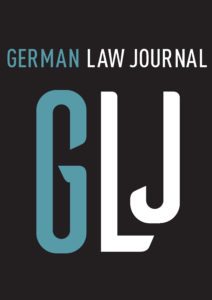Oct 30, 2019
Données bibliographiques / Bibliografische Daten |
|---|
| Auteurs / Autoren: | WALDHOFF, CHRISTIAN; WITTMER, FABIUS |
|---|
| Source / Fundstelle: | https://www.cambridge.org/core/journals/german-law-journal/article/religious-education-in-germany-in-light-of-religious-diversity-constitutional-requirements-for-religious-education/DA53CF0E68B465C7FD4E027BAD3887AF# |
|---|
| Revue / Zeitschrift: | German Law Journal |
|---|
| Année / Jahr: | 2019 |
|---|
| Localisation / Standort: | German Law Journal, Volume 20, Issue 7, pp. 1047-1065 |
|---|
| Catégorie / Kategorie: | Droit de la religion, Religionsrecht |
|---|
| Mots clef / Schlagworte: | Religionsrecht, Religionsverfassungsrecht, Éducation religieuse, Enseignement de la religion |
|---|
 Abstract:
Abstract:
In Article 7, paragraph 3, the German Constitution provides that religious education shall be a part of the curriculum of public school. This is one of the three approaches of dealing with religious education existing today. Originally, religious education as a regular subject at public schools in Germany was only offered by the two Christian Churches—Catholic and Protestant. As the number of Christians decreased and the number of Muslims increased, the demand for Islamic religious education at public schools grew. Therefore, the question arose whether the constitutional law concerning religion is capable of facing the new challenges of religious diversity. This article tries to answer this question with regard to the introduction of Islamic religious education as a measure of adaptiveness. In the first step, the requirements of Article 7, paragraph 3 of the Constitution posed to religious education will be outlined in order to be able to examine in the second step whether Islamic religious education may be introduced at public schools as a regular subject. In this regard, the issue of the qualification of an umbrella association as a religious society and the constitutionality of the advisory board model will be discussed.
Oct 30, 2019
 Abstract by German Law Journal
Abstract by German Law Journal :
The law on state-church relations is no longer exclusively a national concern of the EU Member States. Despite supposedly strict neutrality clauses in the primary law of the EU and rigid statements—
inter alia—by the German Federal Constitutional Court, it is safe to assume the formation of a supranational EU law on religion, which also touches upon the status of the churches and religious associations. This becomes obvious when state-church relations in Europe are reconstructed as a double conflict of laws that comprises interlocked conflicts between ecclesiastical law and worldly law, as well as between EU law and national law. Within the triangular relationship of these different legal spheres, EU law steers state-church relations towards the non-discrimination principle. The controversy in German law on religion between the proponents of a collective, institutionalist understanding (classic “Staatskirchenrecht”) and advocates of a rather fundamental rights-centered, individualist reading of the Constitution (“Religionsverfassungsrecht”) hence needs to be reconsidered. EU law calls for including yet a third paradigm into the debate: Equality.

 Abstract:
In Article 7, paragraph 3, the German Constitution provides that religious education shall be a part of the curriculum of public school. This is one of the three approaches of dealing with religious education existing today. Originally, religious education as a regular subject at public schools in Germany was only offered by the two Christian Churches—Catholic and Protestant. As the number of Christians decreased and the number of Muslims increased, the demand for Islamic religious education at public schools grew. Therefore, the question arose whether the constitutional law concerning religion is capable of facing the new challenges of religious diversity. This article tries to answer this question with regard to the introduction of Islamic religious education as a measure of adaptiveness. In the first step, the requirements of Article 7, paragraph 3 of the Constitution posed to religious education will be outlined in order to be able to examine in the second step whether Islamic religious education may be introduced at public schools as a regular subject. In this regard, the issue of the qualification of an umbrella association as a religious society and the constitutionality of the advisory board model will be discussed.
Abstract:
In Article 7, paragraph 3, the German Constitution provides that religious education shall be a part of the curriculum of public school. This is one of the three approaches of dealing with religious education existing today. Originally, religious education as a regular subject at public schools in Germany was only offered by the two Christian Churches—Catholic and Protestant. As the number of Christians decreased and the number of Muslims increased, the demand for Islamic religious education at public schools grew. Therefore, the question arose whether the constitutional law concerning religion is capable of facing the new challenges of religious diversity. This article tries to answer this question with regard to the introduction of Islamic religious education as a measure of adaptiveness. In the first step, the requirements of Article 7, paragraph 3 of the Constitution posed to religious education will be outlined in order to be able to examine in the second step whether Islamic religious education may be introduced at public schools as a regular subject. In this regard, the issue of the qualification of an umbrella association as a religious society and the constitutionality of the advisory board model will be discussed.
